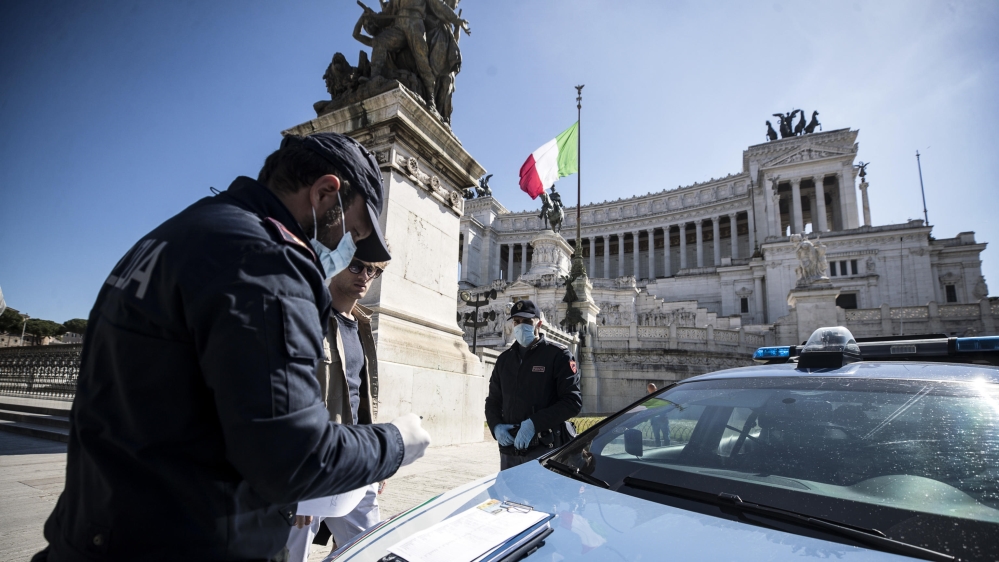As COVID-19 crackdowns grow in Europe, rights groups urge caution
Action to stop coronavirus which limits civil liberties is acceptable but only in short term, human rights experts warn.

London, United Kingdom – As COVID-19 spreads, an increasing number of countries are declaring unprecedented border closures and restrictions on their citizens’ free movement, with European governments introducing measures unheard of in peacetime.
Nearly 200,000 people have contracted the infection worldwide. Of these, more than 7,000 have died, as nearly 80,000 recovered.
Keep reading
list of 3 itemsSpain declares state of emergency over coronavirus
UK to introduce emergency laws to curb coronavirus outbreak
On Tuesday, European Union leaders agreed to close the bloc’s borders for 30 days. It would be down to European countries to implement the closure of their borders to citizens from third countries, said European Commission President Ursula von der Leyen.
All 445 million citizens and residents of the EU now live under some degree of movement restrictions.
On Tuesday, France became the latest European country after Italy and Spain to start a 15-day lockdown, deploying 100,000 police officers and setting up checkpoints across the country.
If they carry the proper paperwork, citizens are allowed to buy groceries and other necessities, and for health or work reasons, where this cannot be carried out from home.
But those found to be breaking the rules risk a 135-euro ($150) fine. France has reported more than 6,000 coronavirus cases and almost 150 deaths.
We need to ensure that when the emergency ends, states return to normal and do not continue to use these powers in ways they were not intended to do.
Italy, now the most affected country after China with more than 2,000 deaths concentrated in the northern regions, last week imposed a total lockdown, closing all bars and shops, with the exception of grocery stores and pharmacies.
Schools, offices and all non-essential services have been shut down. If stopped by police, residents must provide a self-declaration form justifying a reason for being out and confirming they do not have the virus.
If found to be lying, they could face a 206-euro ($226) fine and up to three months in prison.
UN human rights experts called on states to tread carefully, warning against misusing emergency powers invoked.
“The danger is that states, particularly non-democratic or less open societies, would use the opportunity given by the health emergency to crack down on particular minority groups, or individuals or groups that they see as highly problematic,” Fionnuala Ni Aolain, the UN special rapporteur on the promotion and protection of human rights and fundamental freedoms while countering terrorism, told Al Jazeera.
“We need to ensure that when the emergency ends, states return to normal and do not continue to use these powers in ways they were not intended to do,” she said, adding that emergency powers introduced after 9/11 and still in place after 20 years constitute an undesirable precedent.
“States might find, as we often see in the counterterrorism space, that extensive powers are very comfortable, and they give them a lot more leeway than they usually have. The key point is that leeway shouldn’t be used indefinitely.”
Spain declared a state of emergency on Saturday and imposed a nationwide lockdown for over two weeks to stop the virus spreading from its local epicentre in Madrid.
Spanish officials have already said that they expect to renew the measures. Nearly 500 people have died after contracting the virus in Spain, the second worst-affected European country.
The Spanish government deployed more than 1,000 army personnel in 14 cities to help police enforce the lockdown. According to Reuters, 199 people were fined and one person was arrested as of Monday for breaking the rules.

“The general rule is that restrictions on rights, like we’re seeing right now, are legitimate and permissible, if they’re lawful, to meet a legitimate objective, and if they are imposed for the shortest amount of time and proportionate to the objective,” Judith Sunderland, associate director at Human Rights Watch’s Europe and Central Asia division, told Al Jazeera.
“The big question is how governments mitigate the worst impact of these measures, particularly on the most vulnerable in our society.”
UK-based rights group Liberty called for more transparency from the UK government, which critics have said is not acting drastically enough to contain the virus.
In recent days, however, the UK has stepped up its rhetoric and strongly urged more stringent social distancing measures and closures.
According to the Health Protection Coronavirus Regulations published by the government last month, failure to comply with self-isolation rules can be punished with a fine of up to 1,000 pounds ($1,200), and anyone who is suspected to be ill and found outside can be temporarily detained.
“We need the government to offer solutions that build resilience, support vulnerable people and protect communities – criminalisation and over-policing must not be the go-to answer,” said Liberty’s director, Martha Spurrier.
“Any new guidance and legislation issued in the coming weeks and months must be proportionate and time-limited and must have fair and equal access to care at its heart.”